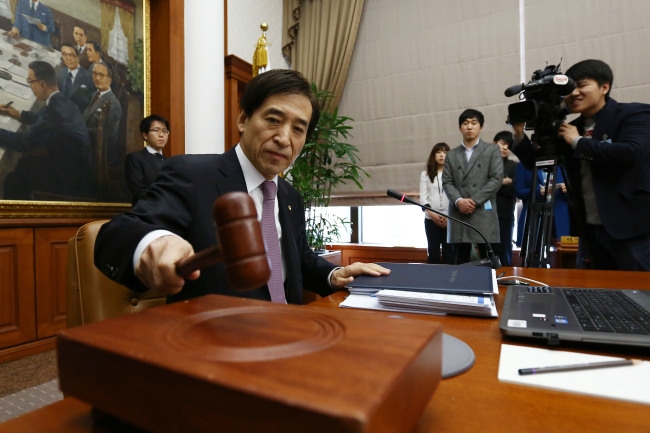BOK cuts key rate to record low
Concerns grow that low borrowing costs will fuel household debt
By Park Hyung-kiPublished : March 12, 2015 - 19:54
The Bank of Korea cut its key interest rate to a record low of 1.75 percent on Thursday to prevent deflation, despite growing concerns over household debt.
The Korean central bank’s unexpected 25-basis-point rate cut opened the era of 1 percent interest rates in Asia’s fourth-largest economy. Korea joins some 20 economies that are pursuing easy monetary policies to combat low growth and compete for weaker currencies.
The record-low rate ― which a majority of analysts expected the BOK to freeze ― could further fuel household debt, which reached almost 1.1 quadrillion won ($975 billion) at the end of last year. Most of this debt is in the form of mortgages.
The Korean central bank’s unexpected 25-basis-point rate cut opened the era of 1 percent interest rates in Asia’s fourth-largest economy. Korea joins some 20 economies that are pursuing easy monetary policies to combat low growth and compete for weaker currencies.
The record-low rate ― which a majority of analysts expected the BOK to freeze ― could further fuel household debt, which reached almost 1.1 quadrillion won ($975 billion) at the end of last year. Most of this debt is in the form of mortgages.

However, BOK Gov. Lee Ju-yeol said the decision to boost the economy over correcting household debt was unavoidable, as growth and inflation were expected to fall well short of the central bank’s expectations amid weakening consumption and private investment.
The central bank forecast the country’s growth to reach 3.4 percent this year, with inflation at 1.9 percent.
“The monetary policy committee believes it made an appropriate decision to lower its rate by 0.25 percentage point as it forecast the growth and inflation to fall well below its initial expectations,” Lee said.
“Although the central bank cut its rate twice last year, it had to make an additional rate cut to support economic recovery.”
The BOK had faced pressure to lower its base rate as various key economic indicators were pointing downward. Korea’s low consumer price growth, which has been near flat, has been a key concern for the economy. When excluding a government-enforced price increase in cigarettes, Korea is in deflation.
Choi Kyung-hwan broke from the standard practice of finance ministers refraining from making comments on the BOK’s monetary policy to welcome the central bank’s rate decision.
“I believe the monetary policy committee made a preemptive move after comprehensively reviewing the economic conditions at home and abroad,” Choi told reporters after holding an economy-related meeting in Seoul on Thursday.
“To a certain extent, a rate cut will help the economy recover.”
The finance minister added that there weren’t any problems with household debt, but it would form a task force with the BOK and the Financial Services Commission to manage debt of low-income households.
Analysts said the central bank had used its “last tool” to lend its economic support, forecasting no more cuts for the rest of this year.
A lower interest rate will make the Korean currency weaker, which helps exports as it makes Korean goods cheaper overseas. The won-dollar exchange fell 0.1 won to 1,126.4 won on Thursday after surpassing 1,130 won.
“We expect the won-dollar exchange to increase by about 30 won over the next two months following the 25 basis point cut,” said Kim Byung-yeon, an analyst at NH Investment & Securities.
“Exporters such as automakers are expected to increase their sales on growing price competitiveness.”
With the U.S. Federal Reserve getting ready to raise its interest rate following strong employment data, the rate gap between Korea and the U.S. could trigger a capital outflow from Korea.
By Park Hyong-ki (hkp@heraldcorp.com)


![[AtoZ into Korean mind] Humor in Korea: Navigating the line between what's funny and not](http://res.heraldm.com/phpwas/restmb_idxmake.php?idx=644&simg=/content/image/2024/04/22/20240422050642_0.jpg&u=)
![[Exclusive] Korean military set to ban iPhones over 'security' concerns](http://res.heraldm.com/phpwas/restmb_idxmake.php?idx=644&simg=/content/image/2024/04/23/20240423050599_0.jpg&u=20240423183955)


![[Herald Interview] Why Toss invited hackers to penetrate its system](http://res.heraldm.com/phpwas/restmb_idxmake.php?idx=644&simg=/content/image/2024/04/22/20240422050569_0.jpg&u=20240422150649)
![[Graphic News] 77% of young Koreans still financially dependent](http://res.heraldm.com/phpwas/restmb_idxmake.php?idx=644&simg=/content/image/2024/04/22/20240422050762_0.gif&u=)






![[Exclusive] Korean military to ban iPhones over security issues](http://res.heraldm.com/phpwas/restmb_idxmake.php?idx=652&simg=/content/image/2024/04/23/20240423050599_0.jpg&u=20240423183955)



![[Today’s K-pop] Ateez confirms US tour details](http://res.heraldm.com/phpwas/restmb_idxmake.php?idx=642&simg=/content/image/2024/04/23/20240423050700_0.jpg&u=)